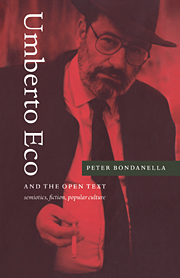Book contents
- Frontmatter
- Contents
- Preface
- ONE Umberto Eco's intellectual origins: medieval aesthetics, publishing, and mass media
- TWO The Open Work, Misreadings, and modernist aesthetics
- THREE Cultural theory and popular culture: from structuralism to semiotics
- FOUR From semiotics to narrative theory in a decade of radical social change
- FIVE “To make truth laugh”: postmodern theory and practice in The Name of the Rose
- SIX Interpretation, overinterpretation, paranoid interpretation, and Foucault's Pendulum
- SEVEN Inferential strolls and narrative shipwrecks: Six Walks and The Island of the Day Before
- EIGHT Conclusion
- Bibliography
- Index
SEVEN - Inferential strolls and narrative shipwrecks: Six Walks and The Island of the Day Before
Published online by Cambridge University Press: 23 October 2009
- Frontmatter
- Contents
- Preface
- ONE Umberto Eco's intellectual origins: medieval aesthetics, publishing, and mass media
- TWO The Open Work, Misreadings, and modernist aesthetics
- THREE Cultural theory and popular culture: from structuralism to semiotics
- FOUR From semiotics to narrative theory in a decade of radical social change
- FIVE “To make truth laugh”: postmodern theory and practice in The Name of the Rose
- SIX Interpretation, overinterpretation, paranoid interpretation, and Foucault's Pendulum
- SEVEN Inferential strolls and narrative shipwrecks: Six Walks and The Island of the Day Before
- EIGHT Conclusion
- Bibliography
- Index
Summary
Although Eco's entire literary career has been marked by a vast production of works, making it difficult for his critics or intellectual biographers even to keep abreast of what he has written, Eco was unusually prolific after the appearance of Foucault's Pendulum. In 1992, the long-awaited sequel to the popular Diario minimo appeared – Il secondo diario minimo – which received a partial English translation as How to Travel with a Salmon & Other Essays. On October 2,1992, Eco received an unusual honor – induction into the celebrated Collège de France in Paris. His inaugural lecture there was entitled “La quête d'une langue parfaite dans l'histoire de la culture europénne” (The Quest for a Perfect Language in the History of European Culture), which later formed the nucleus of another learned study of the “confusion of Babel.” This work, La ricerca della lingua perfetta, appeared in 1993 and was translated two years later as The Search for the Perfect Language. And in 1992–93 Eco delivered the prestigious Charles Eliot Norton Lectures at Harvard University. They were published first in English in the following year and in Italian shortly thereafter. After the publication of Foucault's Pendulum, Eco had jokingly confessed to an interviewer that he composed his second novel only to prove to skeptics that he was not a flash-in-the-pan writer and that he was, indeed, capable of writing more than a single fictional work: “To write a third novel,” Eco mused, “is the same as writing thirty novels, it no longer means anything.”
- Type
- Chapter
- Information
- Umberto Eco and the Open TextSemiotics, Fiction, Popular Culture, pp. 154 - 191Publisher: Cambridge University PressPrint publication year: 1997



